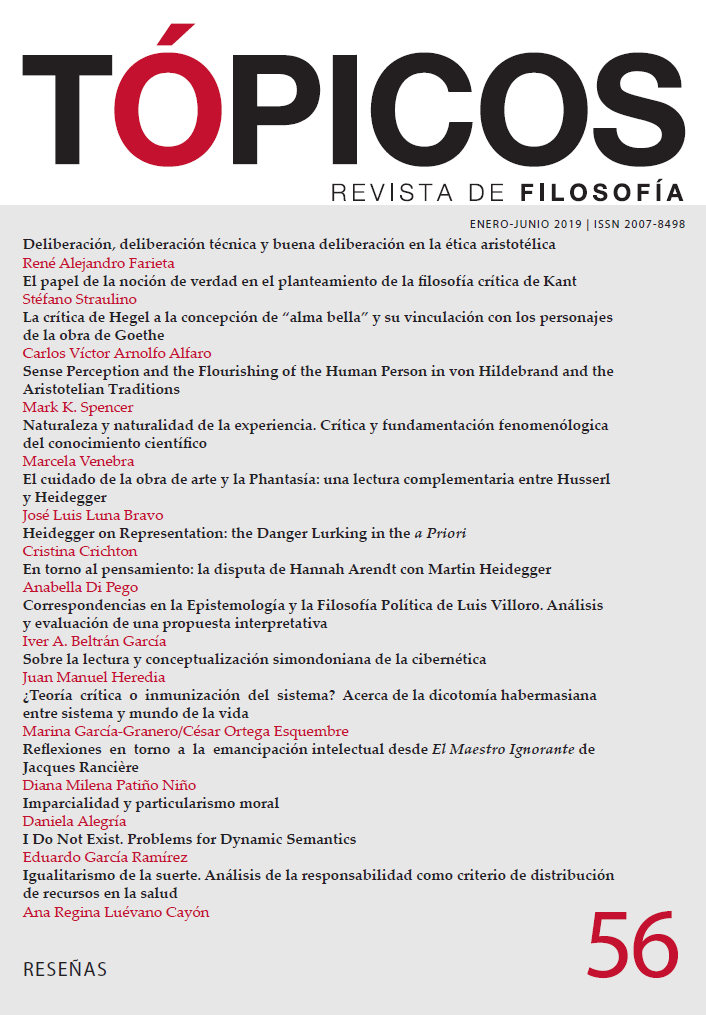Artículos
Publicado 2018-12-13
Palabras clave
- Heidegger,
- representación,
- ciencia moderna,
- lo matemático,
- a priori
- peligro,
- experiencia ordinaria ...Más
Cómo citar
Crichton, C. (2018). Heidegger y la representación: el peligro que acecha en el a priori. Tópicos, Revista De Filosofía, 56, 167-195. https://doi.org/10.21555/top.v0i56.1032
Resumen
La visión de Heidegger acerca del pensar representacional ha sido ampliamente discutida y debatida. En este artículo muestro cómo —basándose en un análisis de lo matemático en la ciencia moderna en Die Frage nach dem Ding— Heidegger establece una distinción entre representaciones intuitivas y representaciones contra la experiencia. Sostengo que este último tipo de representaciones corresponde a su comprensión del modo en que el pensar representacional se da en la modernidad, esto es, la representación moderna. Basándome en un análisis de estos dos tipos de representaciones, afirmo que a mediados de los años 30 Heidegger se da cuenta de que pensar el ser como a priori envuelve un peligro, el cual consiste en que el ser puede romper su relación con aquello que es dado en la experiencia ordinaria y ser determinado solamente por la razón pura, y que este peligro es el factor decisivo que subyace a la visión crítica de Heidegger acerca de la representación moderna.Referencias
- Christensen, Carleton B. (1997). Heidegger’s Representationalism. In The Review of Metaphysics, 51, 1, 77-103.
- ----(1998). Getting Heidegger Off the West Coast. Inquiry. An Interdisciplinary Journal of Philosophy 41, 1, March, 65-87.
- Freeman, L. (2010). Metontology, moral particularism, and the “art of existing:” a dialogue between Heidegger, Aristotle, and Bernard Williams. Continental Philosophy Review, 43, 4, 545-568.
- Glazebrook, T. (1998). Heidegger on the Experiment. Philosophy Today, 42, 3, 250-261.
- ----(2000). Heidegger’s Philosophy of Science. New York, NY: Fordham University Press.
- ----(2001). Heidegger and Scientific Realism. Continental Philosophy Review, 34, 4, 362-401.
- Heidegger, M. (1967). What is a Thing? W. B. Barton and V. Deutsch (trans.) South Bend, IN: Gateway Editions.
- ----(1977). Science and Reflection. In The Question Concerning Technology and Other Essays. W. Lovitt (trans.) New York: Harper & Row.
- ----(1982). The Basic Problems of Phenomenology. A. Hofstadter (trans.) Bloomington, IN: Indiana University Press.
- ----(1984). The Metaphysical Foundations of Logic. M. Heim (trans.) Bloomington, IN: Indiana University Press.
- ----(2003). Metaphysics as the History of Being. The End of Philosophy. Stambaugh (trans). Chicago, IL: Illinois University Press.
- ----(1978a). Metaphysische Anfangsgründe der Logik im Ausgang von Leibniz. Band 26. Frankfurt a. M.: Vittorio Klostermann.
- ----(1978b). Der Zeitbegriff in der Geschichtswissenschaft. Frühe Schriften. Band 1. Frankfurt a. M.: Vittorio Klostermann.
- ----(1984). Die Frage nach dem Ding. Zu Kants Lehre von den transzendentalen Grundsätzen. Band 41. Frankfurt a. M.: Vittorio Klostermann.
- ----(1989). Die Grundprobleme der Phänomenologie. Zweite Auflage. Band 24, Frankfurt a. M.: Vittorio Klostermann.
- ----(1997). Nietzsche. Band 6.2. Frankfurt a. M.: Vittorio Klostermann.
- ----(2000). Die Frage nach der Technik in Vorträge und Aufsätze. Band 7. Frankfurt a. M.: Vittorio Klostermann.
- Kisiel, T. (1973). The Mathematical and the Hermeneutical: On Heidegger’s Notion of the Apriori. In: Ballard E.G. and Scott C.F. Martin Heidegger: In Europe and America. (109-120). The Hague Netherlands: Springer.
- McNeill, W. (1992). Metaphysics, Fundamental Ontology, Metontology 1925-1935. In Heidegger Studies Vol. 8, pp. 63-79.
- Pattison, G. (2000). Routledge Philosophy Guidebook to The Later Heidegger. New York, NY: Routledge.
- Roubach, M. (2008). Being and Number in Heidegger’s Thought. London, UK: Bloomsbury Academic.
- Versenyi, L. (1965). Heidegger, Being, and Truth. New Haven: Yale University Press.
- Wrathall, M. (1998). Intentionality without representations. Heidegger’s account of perception. Philosophy Today, 42, 182-189.







